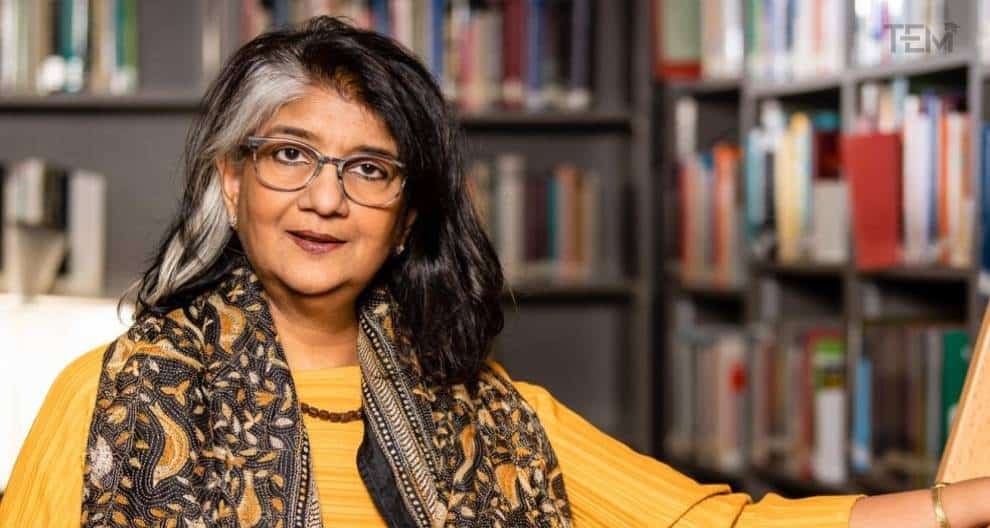The strength of a university comes from the power of critique and of voice, both of which are based on freedom of expression, says Shalini Randeria, President and Rector of Central European University (CEU). Shalini has championed these values throughout her long career in academia and is committed to CEU’s mission of using education as a force for societal change.
Engaging Journey
Shalini was chosen to serve as CEU’s sixth president and rector in 2021, making her the first woman and first member of the global South since the university’s founding thirty years ago. Born in the US and raised in India, Shalini attended the Universities of Delhi, Heidelberg, and Oxford. She was a member of the first cohort of female Rhodes Scholars. In her previous academic roles, she taught social anthropology and sociology at the Free University of Berlin, the University of Munich, and the University of Zurich. Before accepting her position at CEU, she served as Rector of the Institute for Human Sciences in Vienna and Professor of Social Anthropology and Sociology at the Graduate Institute in Geneva. Moreover, she directed the Albert Hirschman Centre on Democracy in Geneva.
Shalini’s commitment to CEU dates from 2002 when she joined the CEU faculty to launch a new Department of Sociology and Social Anthropology. After teaching stints in Zurich and Geneva, she joined CEU’s Board of Trustees in 2017.
Quality since the Beginning
A group of forward-thinking intellectuals including philanthropist George Soros and Czech statesman Vaclav Havel founded CEU in 1991 as an international, English-speaking university to advance democracy, human rights, and the rule of law throughout Central and Eastern Europe and the former Soviet Union. It soon attracted students from the region to study in Prague, Budapest, and Warsaw, and its student body later grew to include more than 100 nationalities at its Budapest campus. When Hungary made changes in its higher education legislation in 2017 that curbed academic freedom for CEU, the university relocated to Vienna, where it opened its doors in 2020.
Tradition, Innovation, and Access
A privately funded research university, CEU is known for combining the greatest elements of American and European academic traditions. It offers degree programs in English at both the undergraduate and graduate levels in the social sciences, humanities, economics, law, environmental sciences and policy, network science, and cognitive science. It offers students from all around the world affordable education of the highest caliber.
With a student-to-faculty ratio of 7:1, CEU fosters a research-intensive and student-oriented academic culture. The university encourages professors, researchers, and students to work across disciplines to address the complex social and political concerns of the 21st century. For a variety of programs, including political science and international relations, philosophy, history, legal studies, and economics, it has received acclaim on a global scale. The faculty is also well-known internationally for its work in innovative disciplines like cognitive science and network and data science. The university continues to invest in innovative interdisciplinary subjects like these.
Welcoming Students to a New Home
Shalini’s first objective is to complete the transformation prompted by its forced dislocation, a transition exacerbated by the pandemic. CEU has been welcomed with open arms in Austria, and Shalini is certain that the institution will benefit from and improve academic life here. Her top priority is to create a new campus for CEU in Vienna that will firmly establish the institution in the city’s educational environment. Already ranked third in Austria, CEU is well on its way to making an impact in Austria and other German-speaking countries.
CEU launched its undergraduate degree programs upon moving to Vienna, and is expanding strategic partnerships with leading universities in Europe and the US.
“We need to give greater visibility to our three innovative interdisciplinary undergraduate programs, especially in western Europe and North America,” Shalini says. “I also aim to sharpen CEU’s research profile by strengthening our partnerships.”
A Forward-looking Academic
Shalini remains an active academic in addition to leading CEU. She is an Excellence Chairholder at the University of Bremen in Germany, where she runs a research group on soft authoritarianism. She is a distinguished fellow at the Munk School of Global Affairs at the University of Toronto, and deputy chair of the class of social and related sciences at Academia Europaea. She also belongs to the UNFPA EECA group’s International Advisory Panel on Population and Development.
Shalini has also written about social movements, law, the state, and the anthropology of globalization. She has worked with historians, political scientists, and legal experts to research democratic theory, soft authoritarianism, the demographics of forcible eviction and dispossession, and the politics of accountability. Additionally, Shalini has directed research projects that take a comparative approach to examine:
- How international investment treaties and arbitration affect governance in countries including Argentina, the Czech Republic, Mexico, and India.
- Counter-hegemonic globalization in India, Columbia, Portugal, and Mozambique.
- The (un)sustainability of changing patterns of food consumption and waste management among middle classes in south and south-east Asia.
- The puzzle of unspent public funds in Italy and India.
A University at the Cutting Edge
CEU is at the forefront of digitalization and has been a pioneer in the introduction of open educational resources. Digital technologies are used to improve educational experiences for its students. Its classrooms feature the latest audiovisual technologies to support virtual teaching. The university’s Center for Teaching and Learning offers support to professors who aim to use online resources. Additionally, CEU has widened access to include students who are not able to attend in person. In response to the war in Ukraine, CEU also established the Invisible University for Ukraine, a hybrid non-degree academic program co-taught with Ukrainian colleagues.
Diverse Opportunities
CEU currently enrolls 1450 students from over 100 countries and its 220 faculty members come from over 50 nations. This adds a variety of perspectives to all facets of university life, both inside and outside the classroom. The uncommon diversity of nationalities, languages, and cultures at CEU creates an ideal environment for learning in small classes under close supervision. Over 80% of its MA students receive financial aid, such as stipends and fee waivers.
According to u-Multirank, CEU is the third-best university in Austria, noted for its outstanding international orientation and high standard of research. CEU is dedicated to fostering a diverse and inclusive environment for working, teaching, and learning. The Office of Inclusion, Diversity, and Equality handles accessibility issues on campus. CEU has also adopted a Gender Equality Plan to address and resolve gender inequities in all facets of its structure and functioning.
Piece of Advice
When asked for a piece of advice for aspiring leaders, Shalini says, “Leaders of educational institutions need to be ready to stand up and defend academic freedom and the academy as a space for pluralism of perspectives and, tolerance of difference.”

ALSO READ: The 10 Futuristic Education Leaders, 2023


